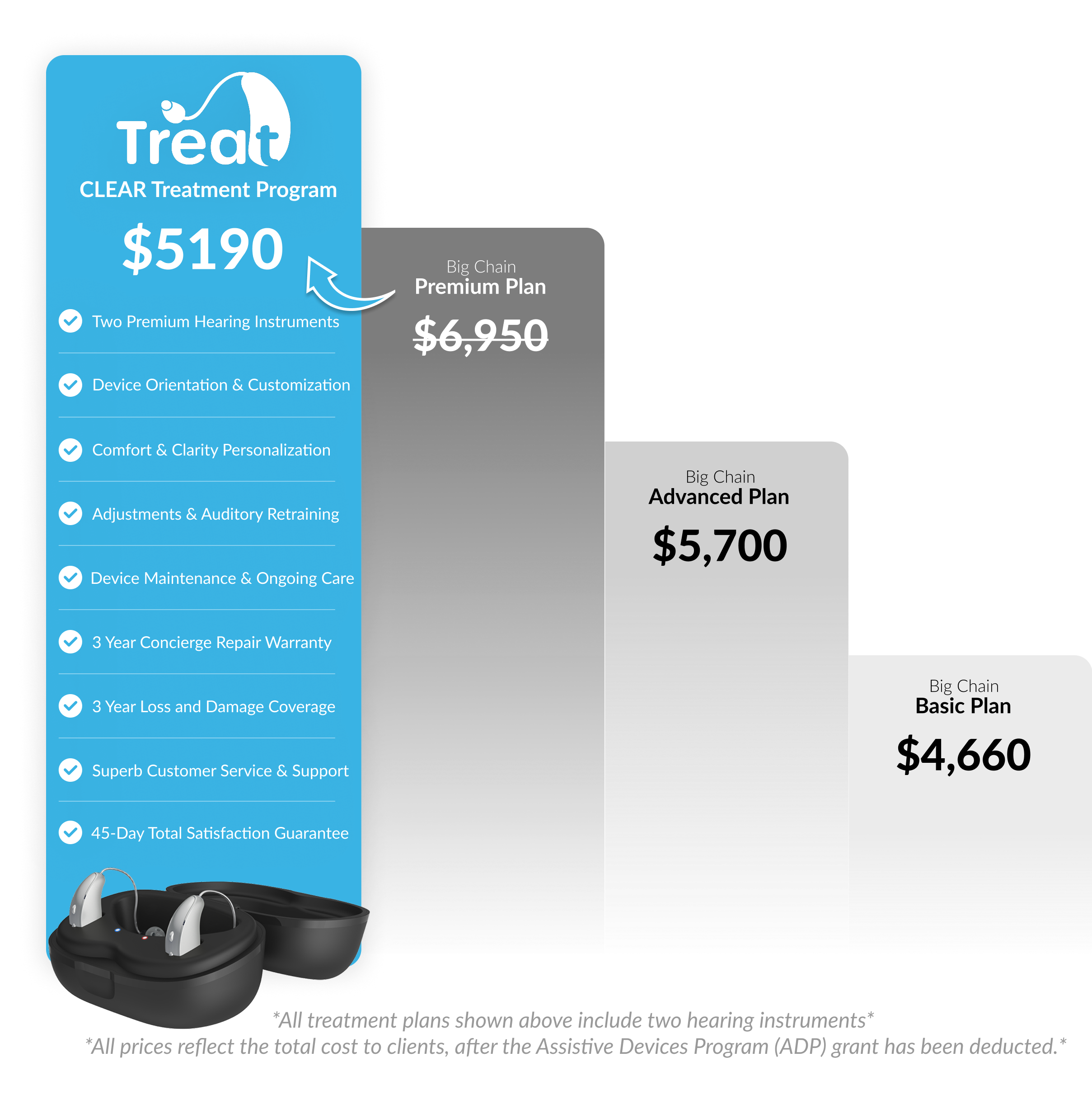Best Hearing Technology,Without the Premium Cost.
Considering Hearing Aids?
At Treat Hearing, we believe everyone deserves the best hearing technology without the premium price tag. Our prices are significantly lower than manufacturer-owned chains, and we offer the latest, top-tier hearing aids — so you never have to settle for less. Plus, we provide superior ongoing care and service, ensuring you're always supported and successful with your hearing instruments. Experience exceptional hearing and unparalleled service, all at a fraction of the cost.
Treat your hearing right with Treat Hearing.
Book an Appointment
Binaural Hearing Instrument Treatment Plans
Treat Hearing vs Big Chains
Treat Hearing offers more for less...
We offer the best hearing technology with superb service and follow up care
at a price that is far better than the big chains


Book an Appointment With Us Today!
If you’re looking to get an effective hearing aid solution, reach out to Treat Hearing Health Care today at (613) 567-3644. We can provide high-quality hearing aid treatment plans that work for you and your budget.
Book an AppointmentFrequently Asked Questions
Let’s discuss some answers to the most common questions about hearing aids. From choosing the right device to understanding maintenance, costs, and insurance coverage, we’re here to make your hearing journey easier. Explore our expert advice and practical tips tailored to help you hear better every day.
How do I know if I need hearing aids?
A person should consider hearing aids when they (or others) notice that hearing difficulties are starting to impact communication, sound enjoyment, sound awareness, personal relationships, quality of life, and participation in conversation and social activities.
What types of hearing aids are available?
Most people wear hearing aids that have a small piece behind the ear (the microphone) with a wire that runs invisibly along the skin to a small piece that sits in the ear (the speaker). It is also possible to have a hearing aid where both the microphone and speaker are situated in the ear, with nothing behind the ear.
How much do hearing aids cost?
At big chain hearing aid clinics a pair of premium hearing instruments can easily cost between $6000-$7000, even after the Assistive Devices Program (ADP) grant. On the other end of the spectrum, hearing aids at Costco Wholesale are sold for a fraction of this cost, but with minimal service and aftercare. At Treat Hearing, a pair of premium hearing aids fit by our experienced audiologists with our exceptional ongoing care and service included is $4590, after ADP.
Are hearing aids comfortable to wear?
While it does take some time and adjustments to get used to wearing hearing aids, most people can completely forget that they are wearing them shortly after putting them on, because they are light-weight and open-feeling.
How do I take care of and maintain my hearing aids?
Cleaning hearing aids is straightforward and often requires little more than wiping them off with a tissue at the end of the day. Regular maintenance involves changing a wax filter, as needed (usually every 2-4 weeks).
How long do hearing aids last?
Our hearing aids come with a 3 year repair warranty; most people wear their hearing aids for 4 - 5 years before considering (or needing to) replace them.
Can hearing aids help with tinnitus?
Most people who have constant ringing in the ears also have an aidable hearing loss. Most of the time, simply treating the hearing loss with hearing aids significantly reduces the perception of tinnitus, when the hearing aids are worn.
Are hearing aids covered under insurance?
Many health insurance policies include coverage for hearing aids. While some plans only contribute a relatively small amount (say $500), others can cover the entire cost. However, most plans are somewhere in between. For example, public servants with the Federal Government get 80% coverage, up to a maximum of $1500 through Canada Life.



